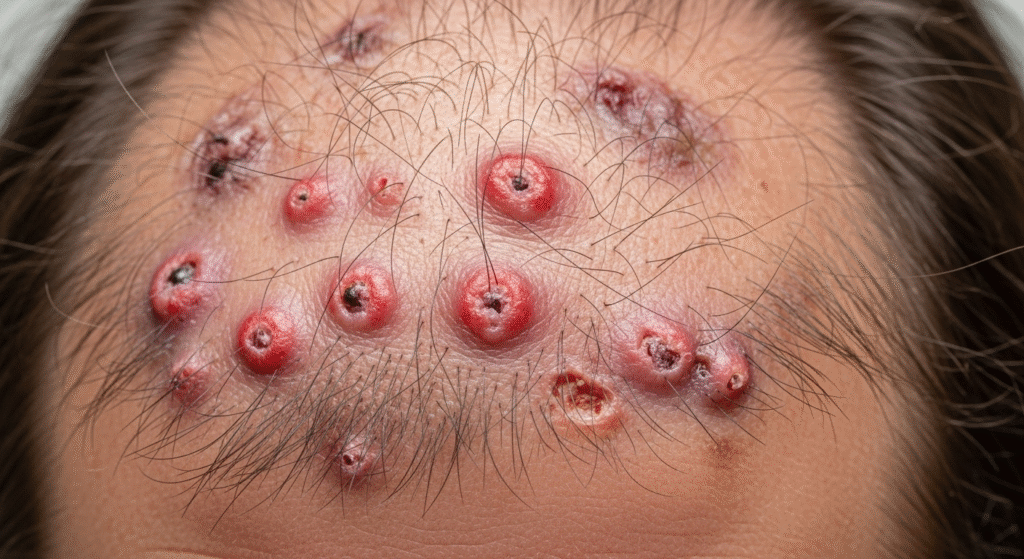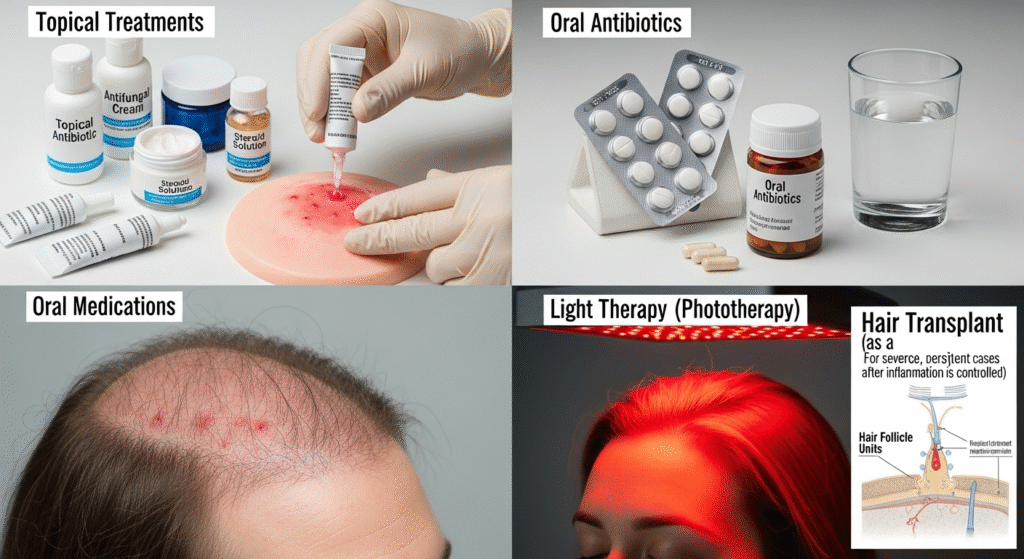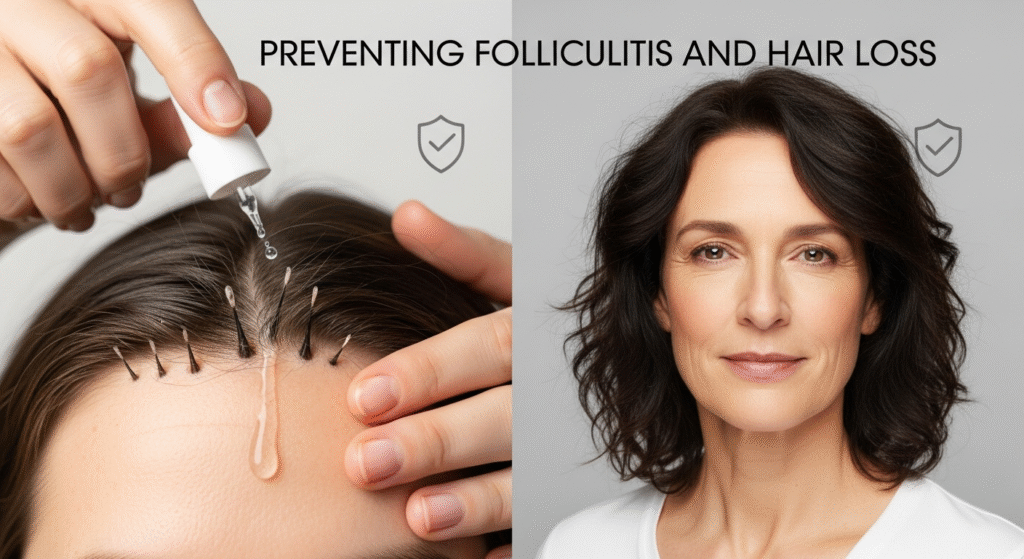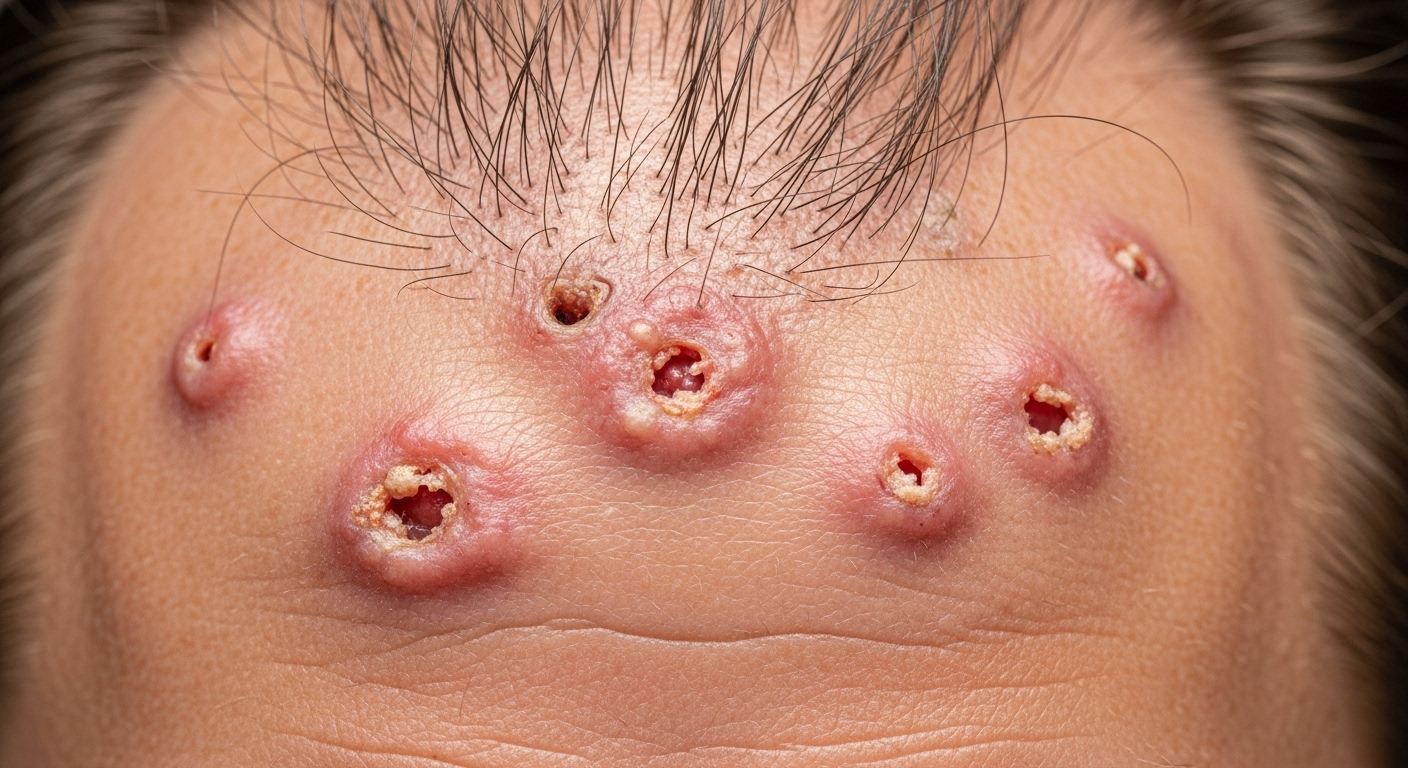Experiencing (Folliculitis and Hair Loss) hair thinning or patchy bald spots? Folliculitis, an inflammation of hair follicles, might be the culprit. This condition can lead to temporary or permanent hair loss if not addressed promptly. In this article, we'll explore the causes, treatments, and preventive measures for folliculitis-related hair loss, providing expert insights to help …
Experiencing (Folliculitis and Hair Loss) hair thinning or patchy bald spots? Folliculitis, an inflammation of hair follicles, might be the culprit. This condition can lead to temporary or permanent hair loss if not addressed promptly.
In this article, we’ll explore the causes, treatments, and preventive measures for folliculitis-related hair loss, providing expert insights to help you manage and recover effectively.

What is Folliculitis?
Folliculitis is a common skin condition that causes inflammation of the hair follicles, typically resulting in small, red bumps or pustules on the skin. It can occur anywhere on the body but is most commonly found on the scalp, face, and neck. When folliculitis affects the scalp, it can lead to hair loss, scarring, and sometimes permanent damage to the hair follicles.
Types of Folliculitis
Superficial Folliculitis
This is the most common form of folliculitis, affecting the upper part of the hair follicle. It is usually caused by bacteria like Staphylococcus aureus and can often be treated with topical antibiotics.
Deep Folliculitis
Deep folliculitis affects the entire follicle, extending to the deeper layers of the skin. It can be more painful and may require oral antibiotics or other medical treatments.
Folliculitis Decalvans
A more severe form of folliculitis, folliculitis decalvans can lead to permanent hair loss. It is often linked to inflammation and infection and may result in scarring alopecia (permanent hair loss due to follicle damage).
How Folliculitis Leads to Hair Loss
Folliculitis causes inflammation in the hair follicles, disrupting the normal hair growth cycle. In severe cases, the follicles may become damaged, preventing the hair from growing back. There are several ways folliculitis can contribute to hair loss:
Inflammation and Follicle Damage
When the hair follicles are inflamed, they may not be able to produce healthy hair strands. This inflammation also weakens the follicles, making them more susceptible to further damage from external factors like scratching or infection.
Scarring Alopecia Explained
Scarring alopecia occurs when the inflammation caused by folliculitis leads to irreversible damage to the hair follicles. As the follicles are destroyed and replaced by scar tissue, hair growth becomes impossible. This is a significant concern for individuals with folliculitis, as the hair loss may be permanent.
Risk Factors for Hair Loss
Several factors can increase the likelihood of folliculitis leading to hair loss. These include:
- Chronic or untreated folliculitis: Long-term inflammation increases the chances of permanent follicle damage.
- Scratching or picking at the affected area: This can worsen the inflammation and lead to scarring.
- Poor hygiene or use of harsh hair products: These factors can irritate the scalp and worsen folliculitis.
Treatment Options for Folliculitis-Related Hair Loss

There are several treatment options available for individuals dealing with folliculitis-related hair loss. Early intervention is key to preventing permanent damage to the hair follicles.
Topical Treatments
Antibiotic Ointments
For superficial folliculitis, topical antibiotics like mupirocin can be effective in treating the infection and reducing inflammation. These treatments can prevent the infection from spreading and allow the follicles to heal.
Antifungal Creams
If the folliculitis is caused by a fungal infection, antifungal creams or shampoos may be prescribed. These treatments help eliminate the fungi and reduce inflammation, improving the condition of the scalp.
Oral Medications
Antibiotics
For more severe or deep folliculitis, oral antibiotics may be necessary to treat the infection from the inside out. Drugs like doxycycline or clindamycin are often prescribed for bacterial folliculitis.
Isotretinoin
In rare and severe cases, isotretinoin (commonly used for acne treatment) may be prescribed. It helps to reduce inflammation and prevent the formation of new follicular cysts, although it is typically reserved for cases of folliculitis decalvans.
Advanced Therapies
Photodynamic Therapy
Photodynamic therapy (PDT) uses light to activate a photosensitive agent applied to the skin. This treatment can be effective in reducing inflammation and killing bacteria that may be contributing to folliculitis. It is especially helpful for patients with recurrent folliculitis.
Laser Treatments
Laser therapy can also help reduce inflammation and improve hair growth by stimulating blood circulation and promoting follicle health. It is commonly used for scarring alopecia caused by folliculitis decalvans.
Preventing Folliculitis and Hair Loss

Prevention is always better than treatment. While it may not always be possible to avoid folliculitis, there are steps you can take to minimize your risk of developing the condition and suffering from hair loss.
Maintaining Scalp Hygiene
Keeping your scalp clean and free from oils, dirt, and bacteria is essential for preventing folliculitis. Use gentle shampoos that do not irritate the scalp and avoid harsh chemical products that may contribute to inflammation.
Avoiding Irritants and Tight Hairstyles
Avoid hairstyles that place excessive pressure on the scalp, such as tight ponytails, braids, or hats. These can irritate the follicles and increase the likelihood of folliculitis developing.
Managing Underlying Conditions
Certain medical conditions, like diabetes or a weakened immune system, can increase the risk of developing folliculitis. If you have an underlying condition, managing it properly can help reduce the chances of folliculitis-related hair loss.
Patient Experiences
Case Studies
Many patients who have experienced folliculitis have successfully regained their hair after early intervention and appropriate treatment. However, those who waited too long and allowed the inflammation to cause significant follicle damage may require more advanced treatments to manage hair loss.
FAQs
Can folliculitis cause permanent hair loss?
Yes, if left untreated, folliculitis can lead to permanent hair loss due to scarring and follicle destruction.
How can I differentiate folliculitis from other scalp conditions?
Folliculitis usually presents as small, red bumps or pustules around hair follicles, whereas other scalp conditions may have different symptoms like flaking or large scaly patches.
Are there natural remedies for folliculitis?
While over-the-counter antifungal and antibacterial shampoos may help, it is important to consult with a dermatologist for more severe cases of folliculitis to avoid further complications.
Ready To Take Your Next Step
If you’re experiencing symptoms of folliculitis or hair loss, don’t wait for the condition to worsen. Schedule a consultation with our experienced dermatologist Dr. Uzma Irfan, an ISHRS-certified surgeon in Islamabad today to receive a personalized treatment plan tailored to your needs.






